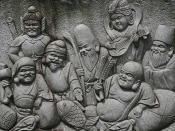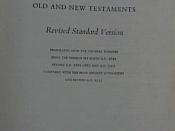The Christian Bible serves as an instrument by which modern societal change can be denounced or affirmed, and, overall, it is a text that carries a great deal of cultural and societal clout in our world. There seems to be two powerful paradigms relative to the male/female relationship within the Bible: a male-dominated patriarchal or hierarchical paradigm, and an egalitarian one (Fewell & Gunn, 1993:22). Hence, it should come as no surprise that the Bible has been a source of much conflict when addressing questions of the role of women in our society in this regard; historical impositions on women have been justified as both scriptural and theological (Prusak, 1974:97). The Genesis creation/fall narratives represent a primary source for a Christian understanding of both the essence and existence of humanity (Fewell & Gunn, 1993:28). With this in mind, it may seem easy to discover the root of female inferiority and sexism that exists today within the doctrines of ancient biblical texts; however, what does exist in the Bible, and most notably in Genesis, upon closer examination is not a view that calls for the direct inferiority of women by virtue of God's whims, but rather is a propensity that describes the effects of sin on the original created order; it does not prescribe that order's intrinsic design (Scovill, 1995).
If God is male, then all males are automatically more God-like than all females, resulting in a clear necessity of a hierarchy within humanity; patriarchy is structured on that assumption (Fewell & Gunn, 1993:24). If we are to believe the patriarchal message derived from Genesis and the rest of the biblical text, we must assume a literal interpretation of the Bible. However, in order to seek a less sexist view of women beyond patriarchy, we must first acknowledge that Christian theology has always recognized, at least theoretically, that all language for God is analogous and metaphorical, and not literal. Hence, the "inspired words"ÃÂ of God in the biblical text cannot, and should not, be interpreted literally. In many respects, the Genesis chapters can be interpreted to reinforce the equality between men and women; however, many have instead taken a patriarchal message from it. The error in doing so lies with the interpreters of the texts, and not in the Bible itself, and through interpretation, women may be conveyed as being either inferior or equal to man. Does the Bible teach an intrinsic subordination of women through the "inspired"ÃÂ words of God, or is this subordination merely situational? Ambiguity arises in regards to women's equality vis-ÃÂ -vis men arises mainly due to the later commentary on the two creation stories contained in Genesis, and in Genesis 3, which narrates the Fall. The first creation narrative speaks of man and woman as equal, created at the same time, both in the image of God. Nowhere in the Bible is it explicit that subservience was to be a role reserved for women; however, it is clearly implied on the basis of the second creation and fall narratives in which the man was created first, woman was created from man to be his helper, woman was named by man, and woman was the first to sin. Ruether argues that woman's subordination reflects both her inferior (by divine creation) status, and her punishment for sin: by divine creation woman represents a lower physical nature (Genesis 2); her sin and fall in Genesis 3 confirms that she represents a lower spiritual nature as well, and cannot reflect the image of God as fully as can man (Ruether, 1983:93). It should be noted, however, that these arguments are not, at any point, clearly stated verbatim in the text; these arguments are merely extrapolations made from the text, which never addresses issues of which gender is more directly related to God's image.
It is in Genesis 3:16 that the issue of the male/female relationship is raised, and because it deals with the question of female subordination, it is of central concern. Here, Adam's role is to be the woman's master. The King James Version (KJV), New International Version (NIV), and Revised Standard Version (RSV) use the term "rule"ÃÂ to describe Adam's role over the woman. The Living Bible uses the term "master"ÃÂ, and the Modern Language Bible uses "dominate"ÃÂ. By implication, all of their descendents would have the same power imbalance between spouses (Lerner, 1986:12). Adam further reinforces his superiority by naming the woman: Eve, as he had named all the other creatures that God had created; it is interesting to note that God named only Adam.
Female subordination to men is viewed as a direct consequence of the transgression and the curse placed upon Eve; Eve was viewed as responsible for the entry of sin into humanity, as her desire to act independently of Adam led to a destruction of paradise (Fewell & Gunn, 1993:30). The repercussions of Eve's transgression has had serious impact on the current world order, as it implied that any attempt by women to go against their God-ordained position is considered wrong, and can be seen as a direct act of rebellion against God's ordinance. It is interesting to note that female subordination in this case is viewed as a punishment, and was never part of God's original divine plan.
The account of the Fall in Genesis 3 makes clear the dignity and responsibility of the woman; she has been given freedom, no less than the man, to choose to obey or disobey God (Fewell & Gunn, 1993:31), and as result of her actions, is judged. As well, it has also been argued that woman was punished not necessarily for her transgression over God, but because of her transgression over Adam; when woman took the fruit and gave it to Adam, she usurped the dominant role that is traditionally seen as belonging to Adam, and hence, woman's punishment is merely a confirmation of what God has approved that man should have "ÃÂ the priority of man over woman within God's hierarchy (Fewell & Gunn, 1993:37).
Christianity in its dominant form has openly promulgated the patriarchal structures of families. Indeed the dominant form of Christianity insisted that families in which men as husbands and fathers ruled over their wives and children were part of the divinely created and mandated order for human society (Scovill, 1995). As a result, efforts to give autonomy or equal rights to women were considered to constitute a rebellion against God. What needs to be addressed is the fact that it was not God's original intent to have woman subservient to man; any reference to divine prescriptions for man to exercise authority over woman are absent prior to Genesis 3, which indicates that God's ideal paradise included an equal partnership between man and woman. While is indeed difficult to read Genesis 3 without assumptions regarding female inferiority, it is of the utmost importance to recognize that patriarchy is not a divine imperative but a human construct "ÃÂ a way of organizing reality; as such, it represents an preservation of male-centered cultural norms that preserve male positions of power and privilege, and are not, in any way, a divine prescription of God's for the creation of man and woman in the first place. Bibliography Primary Texts The Book of Genesis 1-3. The Holy Bible. Revised Standard Version. 1-4. New York: Thomas Nelson & Sons, 1952.
Secondary Sources Fewell, Danna Nolan and David M. Gunn. "Shifting the Blame (Genesis 1-3)"ÃÂ Gender, Power, and Promise: The Subject of the Bible's First Story. 22-38,196-97. Nashville, TN: Abingdon Press, 1993.
Lerner, Gerda. The Creation of Patriarchy. New York: Oxford University Press, 1986.
Prusak, Bernard P. "Women: Seductive Siren and Source of Sin? Pseudepigraphal Myth And Christian Origins."ÃÂ Religion and Sexism: Images of Woman in the Jewish And Christian Traditions. Ed. Rosemary Radford Ruether: 89-116. New York: Simon and Schuster, 1974.
Ruether, Rosemary Radford. "The Consciousness of Evil: The Journeys of Conversion."ÃÂ Sexism and God-Talk: Towards a Feminist Theology. 93, 159-92, 277-79.
London: SCM Press, 1983.
Online Resources Scovill, Nelia Beth. "The Liberation of Women: Religious Sources"ÃÂ 1995, from The Religious Consultation on Religious, Reproductive Health and Ethics at http://www.religiousconsultation.org/liberation.htm#Christianity





